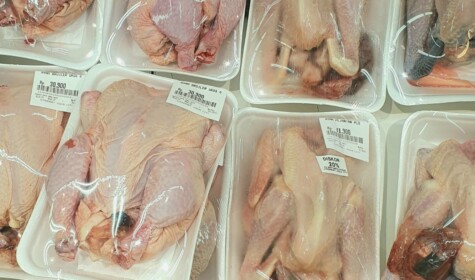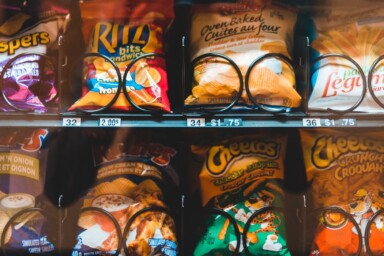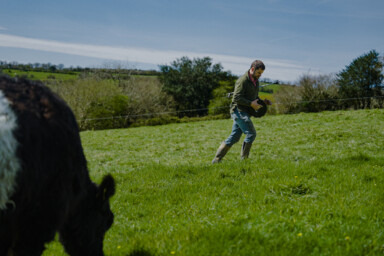Chris Smaje is a social scientist and small-scale farmer and grower who writes widely about what he calls ‘low-energy localism’. His first book A Small Farm Future argues for the importance of locally self-reliant, agrarian communities and agroecological food production. Here, we share an extract from his second book, Saying NO to a Farm-Free Future (Chelsea Green Publishing, June 2023), in which he challenges writer and Guardian columnist George Monbiot’s vision of an industrially manufactured food future and calls it out as a ‘game of chicken’.
A Game of Chicken
On mixed farms with the right stocking densities, chickens and pigs are wonderful waste recyclers whose own wastes are a boon and not a disposal burden. In concentrated feeding operations they’re wasteful consumers of precious arable crops, which could instead feed people directly with much greater efficiency. They’re also incubators of flu and related diseases, threatening humans with pandemics far less likely to spread from local mixed farming.[1] Their wastes from these operations are major pollutants. Their quality of life is poor. And while the numbers of cattle and sheep in aggregate have increased by less than 50 per cent in the past sixty years, pig numbers have increased by a factor of 2.3 and chickens more than eightfold (for reference, human numbers have increased by a factor of 2.6 over that period).[2]
Rangeland ruminants cycle otherwise inaccessible nutrition into the human food web and, worldwide, many are in the hands of third-agriculture local agrarians operating outside commodified market routes. Yet they seem to attract a lot more opprobrium than feedlot chickens and pigs through misleading claims about their supposed ‘inefficiency’. A suspicion arises about exactly who’s pressing this anti-pastoralist narrative and why. Monbiot is no fan of feedlots, but I daresay that badly evidenced articles with titles like ‘The Most Damaging Farm Products? Organic, Pasture-Fed Beef and Lamb’ play pretty well in agribusiness boardrooms.[3] There’s a naïve irresponsibility here that’s hard to fathom.
Perhaps the best that can be said about chicken feedlots is that they’re the easiest way of producing meat worldwide in the kind of bulk that would be required if people in the Global South aspired to eat it in the quantities familiar in the Global North – and why shouldn’t they? The five countries that have increased their chicken flocks the most over the last sixty years are Brazil, Pakistan, Indonesia, China and – way out in front – the US (there’s always the exception that proves the rule, and the exception is usually the US). The growth of soy production in biodiversity hotspots is intimately bound up with this trend.
To me, this is (literally) a game of chicken. Who’s going to call out the fact that, globally, we cannot keep growing production to meet the demand for meat along with endless other products so that the Global Standard Consumer can experience the kind of consumption patterns taken for granted in the Global North? Who’s going to call out the fact that we cannot, either, techno-fix our way out of such problems with energetically extravagant wheezes like meat-mimicking manufactured food? As the dysfunctions of fossil-fuelled global economic growth and commoditized food chains increasingly bear down on us, it seems to me that the people who jump first and start charting a radically different path are the braver ones.
Monbiot’s case for manufactured meat substitutes is built on the correct idea that increased prosperity drives consumer demand to replace plant-based sources of protein like beans with a tastier, and socially higher-status, source (meat) that Earth systems can’t support if it’s generalised across the whole human population. But his case is also built on the questionable idea that consumers will happily embrace meat substitutes if they look and taste like meat, rather than continuing to demand the higher-status, authentic, luxury product precisely because it’s a higher-status, authentic, luxury product. The fact that you can drive a Ford Fiesta doesn’t mean that nobody wants to drive a Bugatti Veyron. The larger problem is in continuing to make mass consumerism the arena of human status consciousness.
There will probably always be a demand for real meat, and the more it becomes a scarce luxury product the greater the social status likely to accrue to those with the means to get hold of it. The greater, too, the incentive for producers to widen its availability within the existing structures of consumer capitalist society by lowering its price – wherein lie the origins of feedlot meat production. Who’s going to be brave enough to acknowledge that unless we redress the extremes of economic inequality and create a different model of society, unless we learn to love a lot of grains and vegetables, with a generous side helping of dairy, just a little bit of meat, and almost no fossil fuels, then – a bit like Dr Seuss’s sneetches – we’ll status emulate our way to ruin?
[1] Wallace, 2016; [2] FAOSTAT; [3] Monbiot, George (2022) ‘The Most Damaging Farm Products? Organic, Pasture-Fed Beef and Lamb’, Guardian, 16 August, cf. Sustainable Food Trust (2022) ‘More Extreme Claims from George Monbiot: The Sustainable Food Trust Responds’, SFT, 2 September.
Use discount code SF30 to receive 30% off Saying NO to a Farm-Free Future until Monday, 31st July. Available to purchase here.
This extract has been reproduced with kind permission from the publisher, Chelsea Green.







